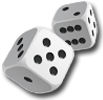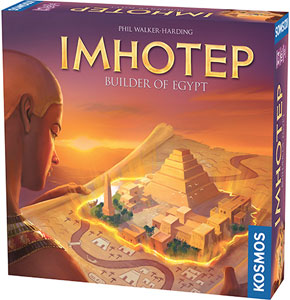



play board games
Board game reviews, strategy tips & session reports
Imhotep Board Game Review
 Stats:
Stats:
No. of players: 2-4
Amount of time to play: 40 min
Age requirements: 10+
Set-up time: minimal
Imhotep is a fast-playing gateway game set in Eygpt. You collect stones, put them on ships and score when they are added to monuments.
Imhotep Rules Description:
Imhotep was a famous Egyptian architect. In this game you must build the most impressive monuments over six rounds.
At the start of each round you flip a card that shows you which boats are read to be loaded with stones. The boats come in different sizes that can carry from one to four stones.
On your turn you my take one of four actions, get stones from your quarry, place a stone on a boat, sail a boat or play a blue card. When you gain new stones they are added to your sled. You may never have more than five stones. You may place a stone on any boat in any open position. In order to sail a boat it must be close to full. You may sail any boat to any open monument and then place the stones on the monument in order from front to back of the boat. Once all four boats have sailed the round is over.
There are five monuments you can sail to, the marketplace, the temple, the obelisk, the pyramids and the burial chamber. And each monument has two sides. Side A is recommended for your first few games.
The marketplace A side has four cards in it. When a ship sails there you take one card for each cube on that boat. Cards can grant end of game scoring, an instant stone placement or a blue action card to play on a later turn. The actions on the blue cards mimic your turn actions but they are more powerful and efficient. The B side of the marketplace is similar to the A side but has one spot with two face down cards on it. The player that takes these only keeps or uses one of them.
The temple is made of up to five stones in a row. On side A, at the end of the round you score one VP for each stone you can see when you look down at the temple. Side B is the same but you can get stones, VPs or a market card.
On side A of the obelisk you stack your stones in a column. The player with the tallest column scores VPs based on the number of players and the end of the game. The B side has two spaces for each players’ stones and then a scoring area that starts at ten VPs and goes down to sfsf VPs. The first two stones placed there go on the spaces provided. Then when a third stone would be added you take all three stones, place them on the highest empty VP space and immediately score that many VPs.
You can sail to the pyramids each space there instantly gets you VPs for each stone you place. The B side has three smaller pyramids and certain spaces get you VPs and other resources.
The burial chamber is made up of three rows. On side A you score VPs based on the number of continuous stones you have there at the end of the game. The other side scores three times based on which player has the most stones in each of the rows.
After the six rounds are over you add VPs for the monuments that score at the end of the game and any market cards you have that score. The player with the most VPs wins.
A Quick Review of Imhotep:
Imhotep is a quick-playing, tactical board game that you can teach and enjoy with most anyone. It can be a bit hard to plan since someone might sail a boat when you weren’t expecting them to or to a monument that is less than optimal. But you must make the most of each turn to win.
The components for this game are really nice. The boards and stones are earthy and everything looks great on the table. The rulebook is very easy to follow and read too.
Imhotep is super accessible and easy to teach. It makes a great gateway board game and works really well for families with kids. Some board games are too long and kids lose focus before they are over.
This game plays fast. It usually does not take long to play and does not overstay its welcome. A player or two with analysis paralysis can make me a liar but there is really not that much here to weight that heavily.
Though it is a light game, Imhotep has some good decision points. Do you add a stone to a ship, sail a ship to a monument that is less than ideal for your opponents or should you just resupply and let someone else sail the ship?
This game is not perfect. But how much you like it might depend on what you are looking for. If you want something with a lot of strategy and little ‘take that’, this is not for you. It is much more tactical and can be a little chaotic. You won’t have total control of where your stones end up and just have to do your best each turn.
If you are looking for a gateway game that is accessible to a wide range of ages, pick up Imhotep. It is also a nice filler that can start or end a game night for more serious gamers.
Score and synopsis: (Click here for an explanation of these review categories.)
Strategy 3 out of 6
Luck 3 out of 6
Player Interaction 4 out of 6
Replay Value 5 out of 6
Complexity 2 out of 6
Fun 4 out of 6
Overall 4 out of 6


Leave a Reply